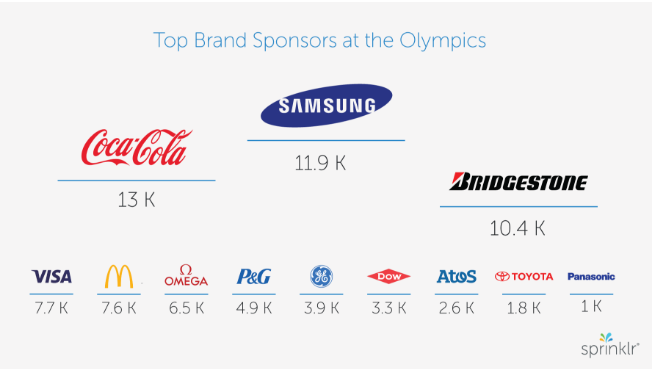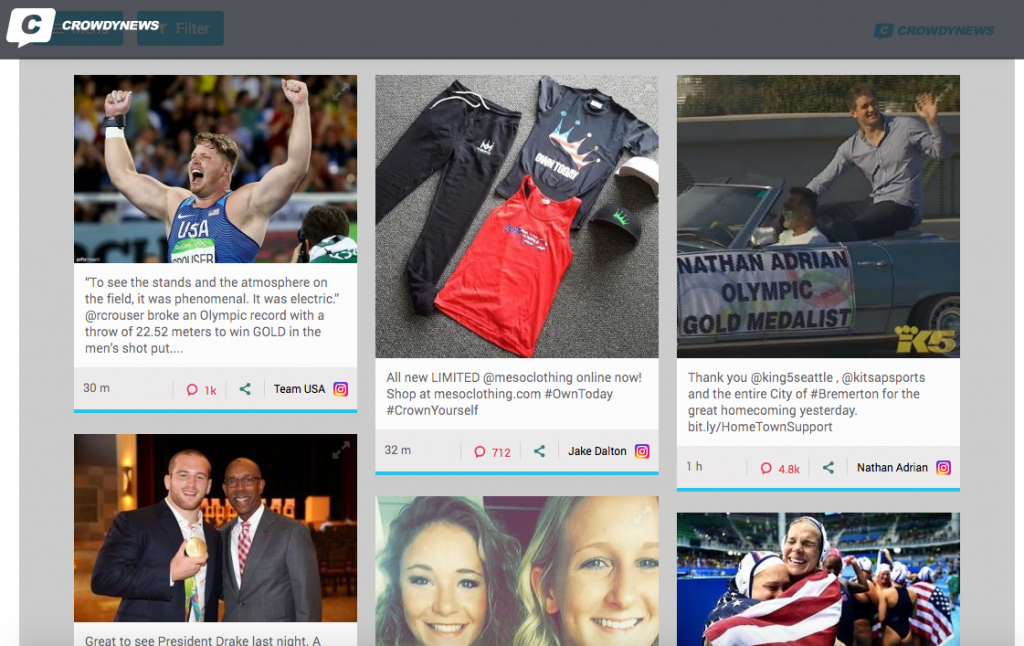The last golden act of sports legends Usain Bolt and Michael Phelps. The debut of a South American city as an Olympics host. Rio de Janeiro 2016 made history, but not only for what happened in the competition fields. The Summer Games this year can be called The Social Games.
Around 3.5 billion people worldwide got involved with the event, and brands, of course, took advantage of that to engage the audience using marketing campaigns specially created for the social media environment.
And it was super effective. Brands like Coca-Cola, Samsung, and McDonald’s reached more than 35,000 mentions in just one week. The most famous drinks company in the world, who has been an official sponsor since Amsterdam 1928, saw their daily engagement increased by 37.6% in the week before the Games, promoting the hashtag #thatsgold.

Source: Sprinklr via AdWeek
Bradesco, a Brazilian bank group, gave away tickets, displayed selfies on big screens, and promoted meetings between athletes and fans. All encouraged through the use of a hashtag they created exclusively for the event.
#Vela de ouro! @lullylucky conversou com Martine e Kahena na Casa BRA. Vai lá conferir em nosso Facebook. #agoraéBRA pic.twitter.com/MEDRm1DyLm
— Bradesco (@Bradesco) 19 de agosto de 2016
So far we’ve only talked about official sponsors. They are part of the Olympics’ ideal world of advertisement. But, what happens when a non-sponsoring brand is not allowed to use terms like, “Rio”, “Gold” and “Victory”?
This was the first time ever that the International Olympic Committee (IOC) has prohibited non-sponsor companies to make references to the games, by launching the polemic Rule 40.
#Rule40 starts tomorrow so I won’t be able to say Thank You to my sponsor. THANK YOU FOR EVERYTHING @newbalance ???????? pic.twitter.com/udSEIPhsIA
— emma coburn (@emmajcoburn) 26 de julho de 2016
But even with limited use, Rio 2016 is a huge opportunity to pass up. Under Armour didn’t need to be an official sponsor to win a Cannes prize with this video about Michael Phelps’ training preparation. The commercial was submitted to the United States Olympic Committee for a waiver in January and went live in March, when Rule 40 was not implemented strictly.
This video was created by Ford, but during the Rule 40 prohibition. It’s a smart example of to how use the Olympic context without direct mention.
The Olympics social media curation
All the buzz generated around the Olympics was an important source of traffic not only for brands, but for publishers as well. Crowdynews collaborated with its media partner customers to collect and publish a real-time, integrated social media stream about The Olympics during their event coverage, covering such topics as competitions in real time, fan’s atmosphere, athlete’s posts in Olympic Village, showcasing the social spirit surrounding Rio 2016. An example of this social stream is illustrated below.

Want to learn more? Book a demo with us by clicking the button below.
